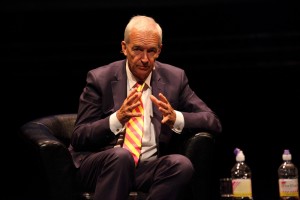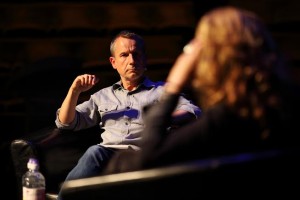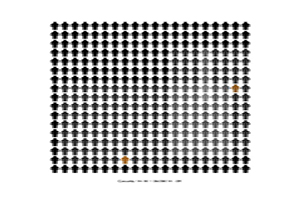
The enduring metaphor of Doc/Fest 2014 was ‘connective tissue’, a visceral analogy used by both filmmaker Ondi Timoner and broadcaster Jon Snow. It captures the severing and suturing power of digital media over a society divided into disparate online communities and conquered by corporate conformism. As always Doc/Fest delivered, offering multiple approaches to this tissue of truth telling.

At one extreme, documentary inclines to caricature, privileging odd over ordinary. Florian Habicht’s Pulp: A Film About Life, Death and Supermarkets opened the festival with a mock-epic that juxtaposed vignettes from Pulp’s 2012 homecoming gig with vox-pops from selective Sheffield oddballs, a narrative omitting the normative fan. Preceded by a band mobbing, the film’s European premiere ended with a subdued Q&A where usually mouthy Paul Morley fell back on the amateur’s roster of repetition and renunciation. Persistently quipping about the redundancy of the critic, Morley redundantly praised a film that was oddly traditional despite its ‘surreal’ interludes and anti-rockumentary aesthetic. Fun but facile, it belongs to a canon of pop-ethnography that Grayson Perry sums up as “pinning people like butterflies to the board.”

Perry’s approach to the human subject is subtler. “Identity is co-created,” he claimed during his talk at the City Hall, and his participant observation documentaries are more collaboration than interview. Bouncing onstage in a pierrot playsuit with pink wig and platforms, Perry explained how his relentless but humanist interrogation of our secret lives reveals our hobbies as social levelers, snakes and ladders between class and gender, recreating the community lost between the cracks of our big but broken society. His Channel 4 series All in the Best Possible Taste culminated in six tapestries titled ‘The Vanity of Small Differences’, a phrase exposing individuality as the magnification of social minutiae. Each busy tableau hides an iPhone and decorative bowl of pebbles, Grayson’s twin emblems of our era (everyone’s got them, just arranged differently). Ultimately, however, Perry undermines his own populist practice by being so damn special.

Channel 4’s Jon Snow is another Great British eccentric who sometimes eclipses the things he presents. “We are in the dawn of the golden age,” he told an attentive morning audience at the Crucible, “a shared voyage of discovery.” With enthusiasm as eye-catching as his pea green socks and yellow tie, Snow argued that in a democratised media, risk taking is key to reportage, or as he puts it, “You need to be offending Ofcom every day of the week”. His recurring analogy is that of ‘scales falling from eyes’, hinting at the transformative power of truth. Asked how he survived the brutality of war zones, he says, “you drink heavily, you smoke a bit of weed.” It’s this kind of maverick honesty that has enabled Channel 4 to lead the way in broadcasting. “What’s lovely,” Snow sums up with a smile, “is to be hated as much as you’re loved.”

This marmite effect underpins Ondi Timoner’s choice of celebs for A Total Disruption. Kickstarting against the pricks, Timoner offers an artistic utopia that eliminates the censoring presence of cultural gatekeepers, those middlemen who stage manage encounters between artists, art and audience. The film trio featured Amanda Fucking Palmer, Obey the Artist and Russell Brand in exciting visions of politicised prosumerism. The lively Q&A afterwards saw Russell Brand (via Skype) looming like a benevolent dictator over Timoner, Jeremy Hardy and Owen Jones, who stepped in when an incensed audience member blamed Brand’s anti-voting stance for UKIP’s storming of Rotherham Council. “Democracy is Excalibur,” Brand argued, “it should transcend castrating Ukip.” Jones was blunter: “I can’t believe I’m having to say this – the reason we have UKIP isn’t because of Russell Brand, [it’s] the result of a politics of envy and thinking injustice is like the weather –[that] there’s nothing you can do about it.”

Whatever the US equivalent of UKIP is (the Tea Party?), its nationalist-socialism polices the high school movie genre, whose protagonists are ersatz immigrants. This was apparent during the sticky delirium of Charlie Lyne’s Beyond Clueless, scored live by Summer Camp at the Crucible. Borrowing crucial scenes from nineties and noughties films, Lyne charts the truncated story arc of American adolescence. Slightly uncomfortable in matching lettermen jackets, Summer Camp were geeks masquerading as jocks, a neat summation of the multiple identity crises on screen. The film made explicit how outsiders must be assimilated by the school’s social system. Using a combination of power both soft (peer pressure) and hard (wedgies), they are either cast out or made over, losing their threatening individuality before entry into the adult world. And with this, we have come almost full circle. While Beyond Clueless deals in caricature again, this time it’s weaponised, and the distillation of fiction’s essence offers a clever critique of the reality it represents.
Words: Alex Murray
Images courtesy of Sheffield Doc/Fest



